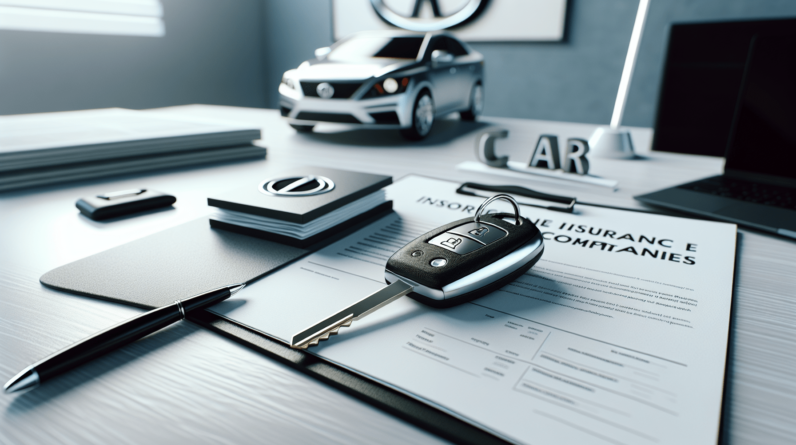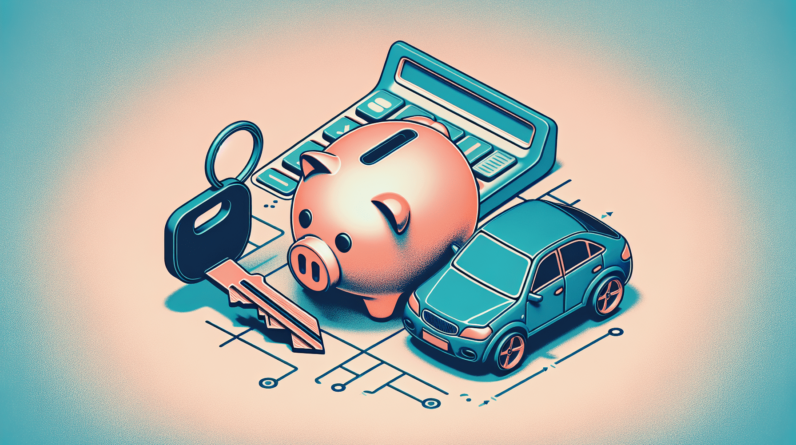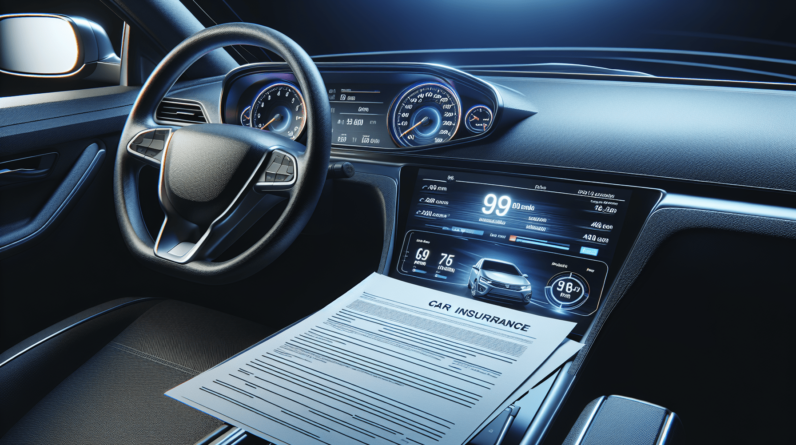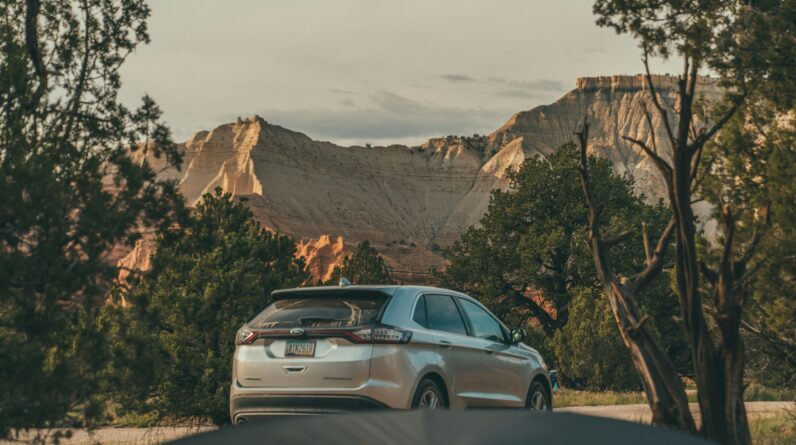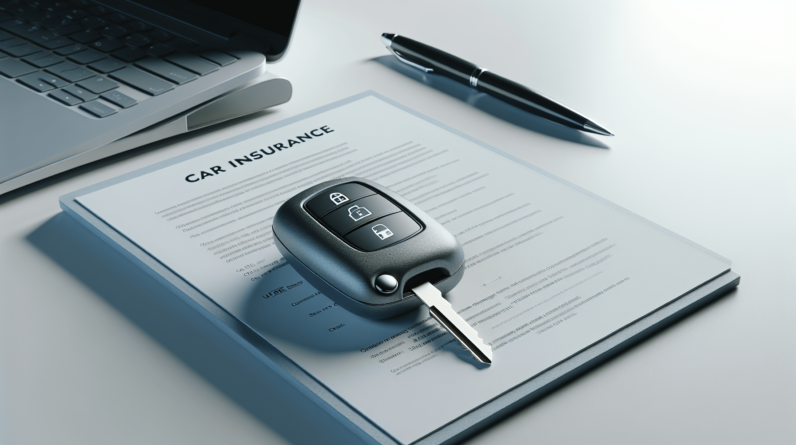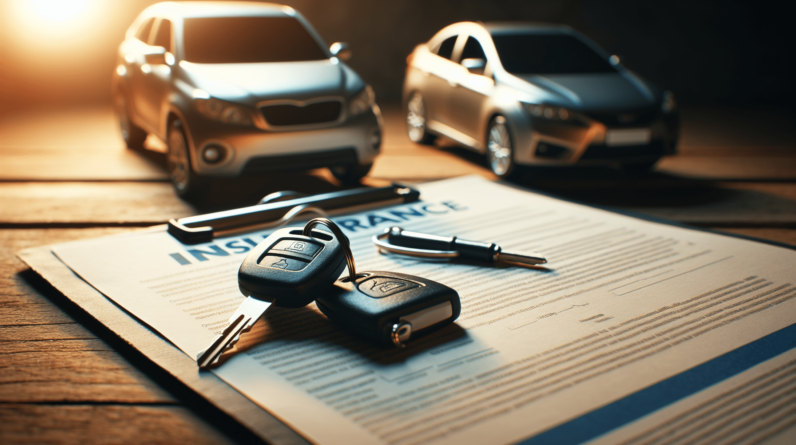
So, you’ve finally decided to buy a used car – congratulations! Now, one important aspect that you shouldn’t overlook is insurance. Buying insurance for your used car is just as crucial as finding the perfect vehicle itself. It gives you peace of mind and protects you from unexpected financial burdens in case of accidents or damages. In this article, we will explore the importance of insurance when buying a used car and provide you with some essential tips to ensure you make an informed decision. Let’s dive in!
What to Consider Before Buying a Used Car
Researching the Vehicle History
Before purchasing a used car, it is important to conduct thorough research on its vehicle history. This can help you uncover any potential issues or red flags that may affect the car’s reliability and performance. You can obtain the vehicle’s history report by using services such as Carfax or AutoCheck, which provide detailed information about the car’s previous accidents, repairs, and maintenance records. By reviewing the vehicle history report, you can make an informed decision and avoid buying a car with a problematic past.
Evaluating the Condition of the Car
When buying a used car, it is crucial to thoroughly inspect its condition. Look for any signs of wear and tear, rust, or damages that might affect the car’s performance or safety. Check the exterior and interior of the car, including the tires, brakes, lights, and the functionality of electronic components such as windows and air conditioning. It is also advisable to take the car for a test drive to assess its performance on the road. By evaluating the condition of the car, you can avoid purchasing a vehicle that may require costly repairs or pose a risk to your safety.
Knowing the Market Value
Before making a purchase, it is essential to have a clear understanding of the market value of the used car you’re interested in. Various factors, such as the make, model, year, mileage, and overall condition, can influence the price of a used car. Websites like Kelley Blue Book and Edmunds can provide you with estimates of the car’s value based on these factors. Additionally, considering the location and local market trends can also help you determine if the listed price is fair or if there is room for negotiation. Having knowledge of the market value can enable you to make an informed decision and ensure you’re paying a reasonable price for the used car.
Considering the Ownership Costs
When purchasing a used car, it is crucial to consider the ownership costs associated with it. Apart from the initial purchase price, there are other expenses you need to account for, such as insurance, maintenance, fuel, and potential repairs. Different cars have varying ownership costs based on factors like fuel efficiency, maintenance requirements, and availability and cost of spare parts. By factoring in these costs, you can assess whether you can afford the ongoing expenses of owning the used car and make a well-informed decision.
Identifying Insurance Requirements
One important aspect to consider before purchasing a used car is identifying the insurance requirements. In most jurisdictions, it is mandatory to have at least liability insurance coverage for any vehicle on the road. Liability insurance helps protect you financially in case you cause an accident and damage other people’s property or injure them. However, it is advisable to consider additional coverage options based on your specific needs and circumstances. Before buying a used car, familiarize yourself with the insurance requirements in your area and understand the coverage options available to ensure you are adequately protected.
Types of Insurance Coverage for Used Cars
Liability Insurance
Liability insurance is the most basic form of coverage required by law in most jurisdictions. It provides financial protection to drivers in case they cause an accident and are found responsible for property damage or bodily injury to others. Liability insurance typically includes two different types of coverage: bodily injury liability and property damage liability. Bodily injury liability covers the medical expenses, loss of income, and other damages resulting from injuries to others, while property damage liability covers the cost of repairing or replacing vehicles or other property damaged in an accident.
Comprehensive Insurance
Comprehensive insurance provides coverage for damages to your used car that are not caused by a collision with another vehicle. It protects against theft, vandalism, fire, natural disasters, and other non-collision related incidents. Comprehensive insurance is especially important for used cars, as they may be more susceptible to certain risks due to age or condition. Having comprehensive insurance can provide you with peace of mind knowing that you are protected against a wide range of potential damages.
Collision Insurance
Collision insurance covers the cost of repairing or replacing your used car if it is damaged in an accident involving another vehicle or object. This type of insurance is particularly important if you have a valuable or relatively new used car that would be costly to repair or replace. Collision insurance can help you avoid significant financial loss in the event of an accident and ensure that your investment is protected.
Uninsured/Underinsured Motorist Coverage
Uninsured/underinsured motorist coverage is designed to protect you in the event of an accident caused by a driver who does not have insurance or has insufficient coverage. If you are involved in an accident with an uninsured or underinsured driver, this type of coverage can help pay for medical expenses, lost wages, and other damages that you may incur. Uninsured/underinsured motorist coverage can provide you with an added layer of financial protection and ensure that you are not left with significant expenses in case of such an unfortunate incident.
Gap Insurance
Gap insurance is an optional coverage that is especially relevant for used cars that are financed or leased. It covers the difference, or gap, between the actual cash value of the car and the remaining balance on your loan or lease in the event of a total loss. When a car is totaled or stolen, standard insurance usually pays only the actual cash value of the vehicle, which may be less than what you owe on your loan or lease. Gap insurance can help bridge that gap and prevent you from being left with a substantial financial burden.

Factors Affecting Insurance Premiums
Age and Make of the Vehicle
The age and make of the used car you are purchasing can have a significant impact on your insurance premiums. Generally, older cars and those with lower market values tend to have lower insurance premiums, as they typically cost less to repair or replace. On the other hand, newer or higher-value used cars may have higher insurance premiums, as the cost of repairing or replacing them is generally higher. Additionally, certain makes and models may be more prone to theft or have higher repair costs, influencing the insurance premiums as well.
Driving History
Your driving history plays a crucial role in determining your insurance premiums. Insurance companies consider factors such as your previous accidents, traffic violations, and claims history to assess your risk level as a driver. If you have a clean driving record with no accidents or violations, you may be eligible for lower insurance premiums. On the other hand, a history of accidents or violations may lead to higher insurance rates, as it indicates a higher likelihood of future claims.
Coverage Limits and Deductibles
The coverage limits and deductibles you choose for your used car insurance also affect your premiums. Coverage limits refer to the maximum amount an insurance company will pay for a covered claim. Higher coverage limits generally result in higher premiums, as they offer greater financial protection. Deductibles, on the other hand, are the out-of-pocket expenses you must pay before your insurance coverage kicks in. Choosing a higher deductible can lower your premiums, but it also means you will have to pay more if you need to file a claim.
Location of the Vehicle
The location where you primarily park and drive your used car can impact your insurance premiums. Areas with higher rates of accidents, theft, or vandalism are typically associated with higher insurance premiums. If you live in an urban area or a neighborhood with a high crime rate, be prepared for potentially higher insurance costs. Conversely, if you live in a rural or suburban area with lower accident and crime rates, you may enjoy lower insurance premiums.
Annual Mileage
The amount of annual mileage you plan to put on your used car also affects your insurance premiums. Generally, the more you drive, the higher the risk of being involved in an accident. Insurance companies consider the annual mileage as an indicator of risk, so if you plan to drive a significant distance, your insurance premiums are likely to be higher. Conversely, if you drive less frequently or have a short commute, you may be eligible for lower insurance premiums.
Getting Multiple Quotes
When buying insurance for your used car, it is essential to obtain quotes from multiple insurance companies. This allows you to compare the coverage options and premiums offered by different insurers and make an informed decision. Online comparison tools or contacting insurance agents directly can help you gather multiple quotes quickly and easily. Getting multiple quotes ensures that you are getting the best possible coverage at a competitive price.
Comparing Coverage Options
In addition to comparing premiums, it is crucial to carefully review and compare the coverage options each insurance policy offers. Look for policies that provide the necessary coverage based on your needs and preferences. Consider factors such as deductibles, coverage limits, and additional benefits or riders offered by each policy. Remember that finding the cheapest policy may not necessarily provide you with the best coverage for your specific situation.
Checking the Insurer’s Reputation
Before finalizing your insurance purchase, it is important to check the reputation and financial stability of the insurance company. Look for customer reviews, ratings, and complaints to get an idea of the insurer’s reliability and customer service. Additionally, check the insurer’s financial ratings from credible agencies such as AM Best or Standard & Poor’s to ensure their ability to meet their financial obligations. A reputable and financially stable insurance company can provide you with peace of mind knowing that you are dealing with a reliable insurer.
Understanding the Policy Terms and Conditions
Once you have selected an insurance policy, take the time to thoroughly read and understand its terms and conditions. Pay attention to the coverage exclusions, limits, deductibles, and any additional requirements or obligations. Seek clarification from your insurance agent or representative if there is any ambiguity or if you have any questions. Understanding the policy terms and conditions helps avoid any surprises or misunderstandings in the future and ensures that you are aware of your rights and responsibilities as a policyholder.
Seeking Discounts and Bundling Options
When purchasing insurance for your used car, be sure to inquire about any available discounts or bundling options that can help reduce your premiums. Many insurance companies offer discounts for factors such as safe driving records, completing defensive driving courses, or having multiple policies with the same insurer, such as home and auto insurance. Taking advantage of these discounts can significantly lower your insurance premiums and save you money in the long run.
Insurance Transfer and Registration Process
Transferring Existing Insurance Policy
If you already have an existing insurance policy, you may be able to transfer it to your newly purchased used car. Contact your insurance provider and inform them about the change of vehicle. They will guide you through the process and make the necessary adjustments to your policy. Transferring your existing insurance policy can save you time and effort in searching for a new insurance provider, especially if you have a good relationship with your current insurer.
Providing Necessary Documentation
When transferring your insurance policy or purchasing a new one, you will need to provide certain documents to the insurance company. These documents typically include proof of ownership of the used car, such as the title or registration documents, as well as your driver’s license and any other information required by the insurer. Make sure to gather all the necessary documents before contacting the insurance company to ensure a smooth and efficient process.
Updating Vehicle Information
When initiating the insurance transfer or purchasing a new policy, it is essential to provide accurate and up-to-date information about the used car. The insurance company will require details about the car’s make, model, year, VIN (Vehicle Identification Number), and any modifications or aftermarket upgrades. Providing accurate information ensures that you receive the appropriate coverage and that there are no issues when filing a claim in the future.
Paying the Premium
To activate your insurance coverage, you will need to pay the premium to the insurance company. The premium is the amount you pay for your insurance coverage and can be paid in a lump sum or in installments. The insurance company will provide you with various payment options, such as credit card, bank transfer, or check. Make sure to pay the premium on time to avoid any lapse in coverage.
Completing the Registration Process
In addition to obtaining insurance, you will also need to complete the registration process for your used car. This typically involves visiting your local Department of Motor Vehicles (DMV) office and providing the necessary documents, such as proof of ownership, insurance, and identification. The DMV will issue you a new registration and license plates for your used car. Completing the registration process ensures that your used car is legally allowed to be driven on the roads and that both your vehicle and insurance information are up to date.
Additional Considerations for Used Car Buyers
Vehicle Inspection and Maintenance
After purchasing a used car, it is important to prioritize vehicle inspection and maintenance. Schedule regular inspections with a trusted mechanic to identify any potential issues or areas that may require attention. Keeping up with routine maintenance, such as oil changes, tire rotations, and brake inspections, ensures the ongoing reliability and safety of your used car. By investing in proper maintenance, you can prevent major repairs, prolong the lifespan of your vehicle, and potentially lower your insurance premiums.
Extended Warranty and Mechanical Breakdown Insurance
Consider purchasing an extended warranty or mechanical breakdown insurance for your used car. While these additional coverages may come at an extra cost, they can provide financial protection in case of unexpected mechanical failures or breakdowns. Extended warranties typically cover major components and systems of the vehicle, while mechanical breakdown insurance provides coverage for repairs due to mechanical failures. These coverages can bring you peace of mind and potentially save you from substantial repair costs.
Protecting against Theft and Vandalism
Used cars are often targeted by thieves and vandals. To protect your investment, consider installing anti-theft devices such as car alarms, steering wheel locks, or tracking systems. These security features can deter potential thieves and reduce the risk of theft or vandalism. Additionally, informing your insurance company about these security measures may qualify you for discounts on your insurance premiums.
Coverage for Aftermarket Parts
If you have made any modifications or installed aftermarket parts on your used car, it is important to inform your insurance company and ensure that they are properly covered. Some insurance policies may not automatically provide coverage for aftermarket parts or modifications, so it is crucial to discuss this with your insurer and make any necessary adjustments to your policy. Failing to disclose aftermarket parts can result in denied claims or insufficient coverage in case of damages.
Reviewing and Updating Coverage Regularly
As time goes on, your insurance needs may change. Regularly review your insurance coverage and make any necessary updates to ensure that you have adequate protection for your used car. Factors such as changes in your driving habits, the value of your car, or personal circumstances may require adjusting your coverage limits, adding or removing coverage options, or seeking better insurance rates. By reviewing and updating your coverage regularly, you can ensure that you have the most suitable insurance policy for your needs.
Frequently Asked Questions
Do I need insurance before buying a used car?
While insurance is not required before purchasing a used car, it is highly recommended to have insurance in place before taking ownership. Driving an uninsured car is illegal in most jurisdictions, and being involved in an accident without insurance can have severe financial consequences. Additionally, having insurance coverage can protect you in case the car gets damaged or stolen before you officially take ownership.
Can I transfer my existing insurance policy to the used car?
Yes, in many cases, you can transfer your existing insurance policy to your new used car. Contact your insurance provider and inform them about the change of vehicle. They will guide you through the process and make the necessary adjustments to your policy. Transferring your existing policy can save you time and effort in searching for new insurance coverage, especially if you have a good relationship with your current insurer.
What should I do if the insurance rates are too high?
If you receive insurance quotes with rates that are higher than expected, there are a few things you can do. First, consider contacting different insurance companies to obtain quotes from multiple sources. Each insurance company weighs various factors differently, so you may find better rates by shopping around. Additionally, look into potential discounts or bundling options that may be available to you. If necessary, you can also adjust your coverage limits or deductibles to find a more affordable option.
There are several strategies you can use to reduce your insurance premiums for a used car. Maintaining a clean driving record, completing defensive driving courses, and having a good credit score can result in lower rates. You can also consider increasing your deductibles, as higher deductibles typically mean lower premiums. Additionally, bundling your insurance policies with the same provider or inquiring about available discounts can help reduce your premiums.
Is it necessary to include extra coverage options?
While liability insurance is the minimum required coverage in most jurisdictions, it is advisable to consider additional coverage options based on your needs and circumstances. Comprehensive and collision insurance can provide additional protection for your used car, especially if it is relatively new or valuable. Uninsured/underinsured motorist coverage can safeguard you against accidents involving drivers without insurance. Gap insurance is particularly relevant for financed or leased used cars. Assess your needs and consult with an insurance professional to determine which additional coverage options are right for you.
Tips for a Smooth Insurance Buying Process
Start Shopping for Insurance Early
To ensure a smooth insurance buying process, start shopping for insurance before you purchase a used car. This allows you to gather quotes, compare coverage options, and make an informed decision without feeling rushed. By giving yourself ample time, you can also explore potential discounts and negotiate with insurers to find the best possible coverage at the most competitive price.
Maintain a Good Driving Record
Having a clean driving record can significantly impact your insurance premiums. By practicing safe driving habits, following traffic laws, and avoiding accidents or violations, you can maintain a good driving record and potentially qualify for lower insurance rates. Drive responsibly, keep distractions to a minimum, and prioritize safety to reduce the risk of accidents or incidents that can affect your insurance premiums.
Seek Expert Advice if Needed
Navigating the insurance market can sometimes be overwhelming, especially for first-time buyers. If you are unsure about any aspect of purchasing insurance for your used car, don’t hesitate to seek expert advice. Insurance agents or brokers can provide guidance, answer your questions, and recommend suitable coverage options based on your specific needs and budget. Their expertise can help you make informed decisions and ensure that you have adequate insurance protection.
Review the Policy Before Signing
Before finalizing the purchase of insurance for your used car, carefully review the policy documents. Pay attention to the coverage details, exclusions, deductibles, and any other terms and conditions. If you come across any clauses or provisions that you do not understand or have concerns about, seek clarification from your insurance agent or representative. It is important to have a clear understanding of what is covered and what is not before signing the policy.
Keep All Insurance Documents Organized
Once you have purchased insurance for your used car, it is crucial to keep all the insurance documents organized and easily accessible. This includes the policy documents, proof of insurance, and any correspondence or receipts related to your coverage. Having organized insurance documents ensures that you can readily provide the necessary information in case of an accident, a claim, or any other insurance-related situation. It also allows you to review your coverage periodically and make any necessary updates or changes.
Conclusion
Purchasing a used car is an exciting experience, but it is important to consider insurance requirements and coverage options to protect your investment and comply with legal obligations. Take the time to research the vehicle history and evaluate its condition before buying. Understand the market value and assess the ownership costs to ensure affordability. Familiarize yourself with the insurance requirements and consider appropriate coverage options for your used car.
By comparing quotes, checking the insurer’s reputation, and understanding policy terms and conditions, you can navigate the insurance market effectively. Complete the insurance transfer and registration process smoothly by providing the necessary documentation and paying the premium. Additionally, consider factors like vehicle inspection, extended warranty, and protecting against theft to safeguard your used car. Regularly review and update your coverage to meet your changing needs. By following these guidelines and tips, you can make the insurance buying process for your used car hassle-free and ensure that you have adequate protection.

